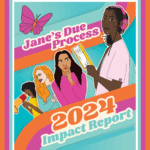After hours of contentious debate each in the House and the Senate, House Bill 3994 was signed into law by Governor Greg Abbott on June 12, 2015. The law, which went into effect on January 1, 2016, makes the judicial bypass safety net inaccessible for most Texas teens, creating a de facto ban on abortion for minors who cannot obtain parental consent.
HB 3994 is chalk-full of restrictions to current judicial bypass law and was written via “stakeholders” meetings that included only anti-abortion activists and not the attorneys who serve as attorney ad litem or guardian ad litems for Janes, domestic violence advocates, law enforcement, court clerks, judges, or physicians or other experts.
The law adds sweeping enforcement powers over anyone involved in these cases — including a family member — to the Attorney General.
- Buried at the back of a senate floor amendment is a broad provision giving the Attorney General enforcement power over the entire parental bypass law even as the bill added multiple, and often vague provisions to the law.
- Further, the bill adds civil penalties of up to $10,000 for a “person” who “intentionally, knowingly, recklessly, or with gross negligence” violates the law. That would include a family member, perhaps someone who raised the minor, inadvertently (but “recklessly” or with “gross negligence”) violating one of the many technical traps in the proposed law. Jane’s and judges are exempted from these penalties.
HB 3994 and the Supreme Court Rules restrict access to the courts and amounts to an arbitrary veto that prevents Janes from having an effective opportunity for a bypass by:
- Eliminating the back stop that renders a case “deemed granted” when a judge fails to timely rule, and instead the case is “deemed denied”, thus allowing judges to automatically veto a young woman’s right to an abortion without even speaking to her. Further, this provision leaves Jane with nothing to appeal, condemning her to a legal purgatory while her pregnancy advances.
- Deleting a requirement that CPS assist abuse victims in its custody to apply for a bypass.
- Attempting to force individual Janes to litigate the constitutionality of the law so that the law effectively prevents them from accessing the courts or health care.
HB 3994 endangers the anonymity of Janes seeking a bypass and exposes the Janes to danger and abuse by:
- Deleting the anonymity requirement replacing it with the lesser “confidentiality” even while requiring that Jane put her address and phone number in her request for a bypass. The Supreme Court Rules require that Jane list her name in the court file even though the statute does not require it. While the file is supposed to be confidential, one politically motivated staffer or even inadvertently lost paperwork could expose Jane.
- Limiting venue to county of residence, or if that county has less than 10,000 people, to county of residence, a neighboring county or the county where the abortion facility is located. This would require that the vast majority of Janes file in their home counties where they may be recognized at the courthouse and in rural, one-judge courthouses where confidentiality is near impossible.
- Deleting the physical, sexual or emotional abuse ground and only asking judges to consider physical and sexual — but not emotional — abuse as part of the “best interest” ground. While HB 3994’s sponsor stated that the abuse ground was simply part of best interest now, the language ignores the damage verbal abuse and abandonment does.
- Instead of trusting the judiciary to ensure the safety of teenagers, the law requires naively inflexible reporting and law enforcement investigation timelines potentially blowing up tenuous family violence situations and ignoring the experience and professionalism of law enforcement, judges, lawyers, and domestic violence advocates.
In addition to eliminating the enforcement to ruling deadlines, HB 3994 further disregards the expeditiousness requirement of these cases by:
- Extending the time for trial and the court of appeals to rule from two to five business days each, potentially dragging the case out for weeks.
- Deleting the current requirement that the court rule immediately after the hearing.
Without a legitimate reason, HB 3994 would treat bypass cases differently from other civil cases by:
- Raising the burden of proof from “preponderance of the evidence” to “clear and convincing evidence” in a case where the litigant is trying to secure her constitutional right to decide whether to become a parent.
- Prohibits non-suits (voluntary dismissals), but allows a re-file if there is a “material change in the circumstances.”
- Requires attorneys, paid or pro bono, who file cases to swear — subjecting them to penalty of perjury — to the truth of the minor’s claims regarding venue and application history, including representations of her address.
- Prohibiting the attorney ad litem and guardian ad litem from being the same person — even though in CPS cases such dual representation is the standard — a procedure that may be necessary when there is not an hour to spare for a particular Jane.
- Prohibiting a judge from allowing Jane to appear by Skype or other technological means no matter how dangerously abusive her home may be.



